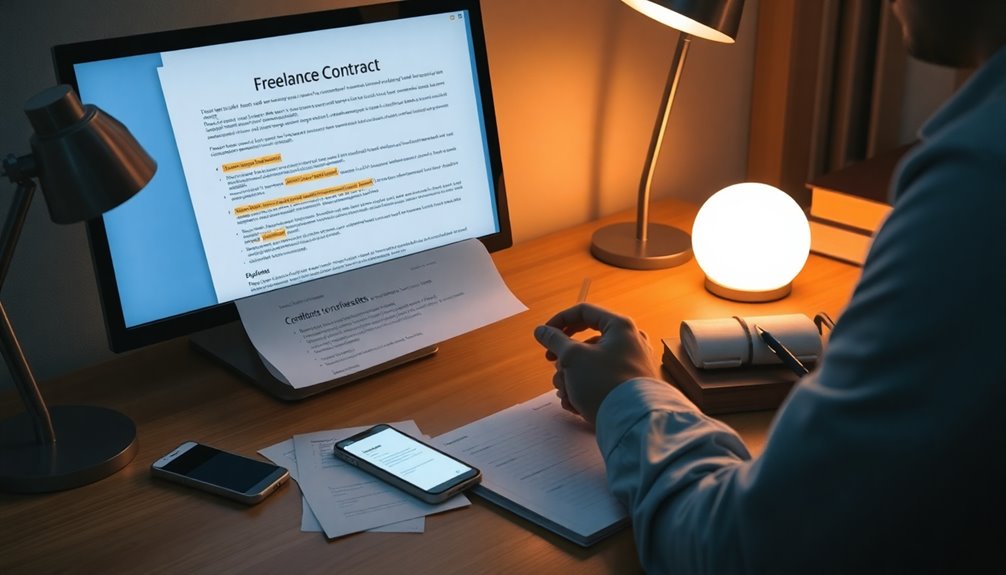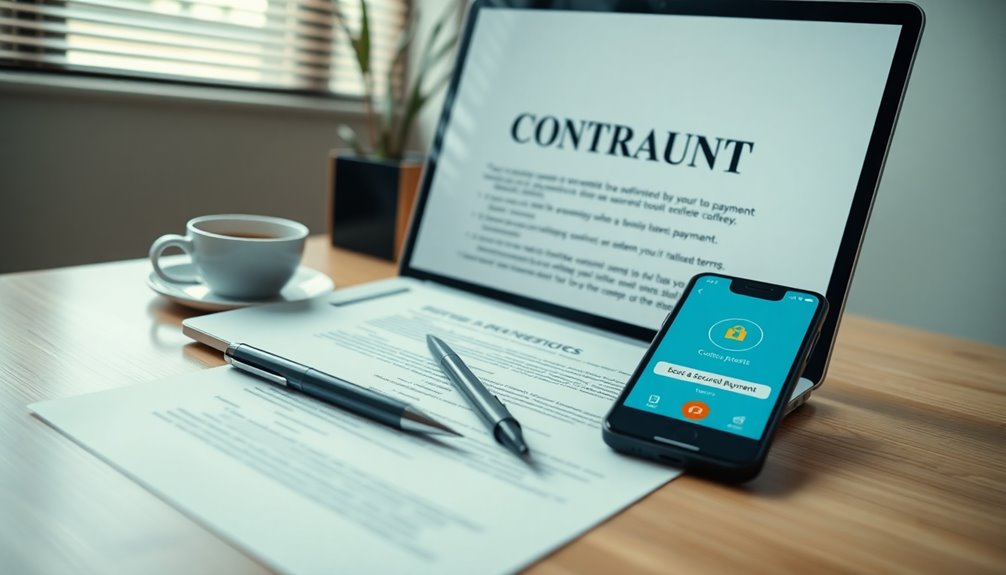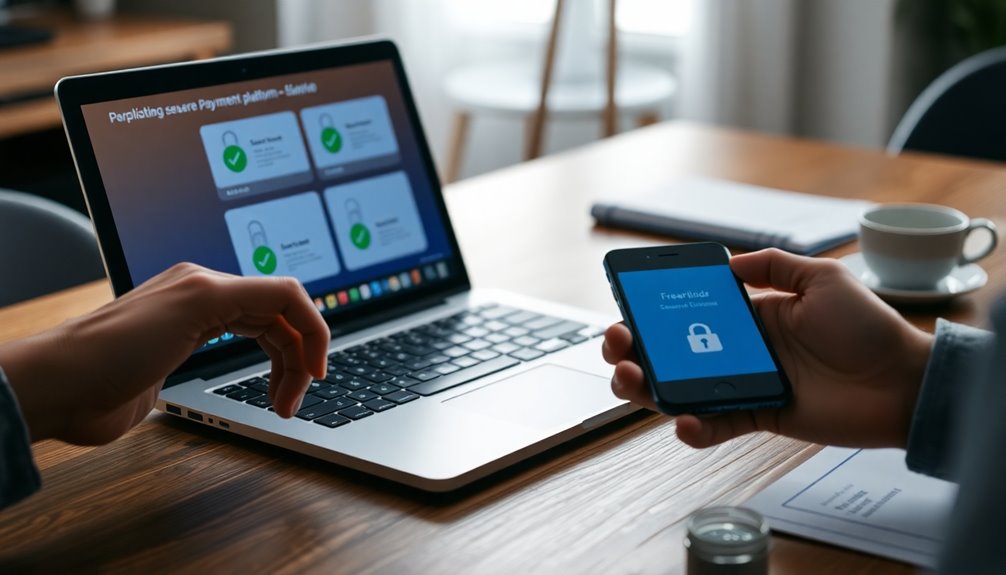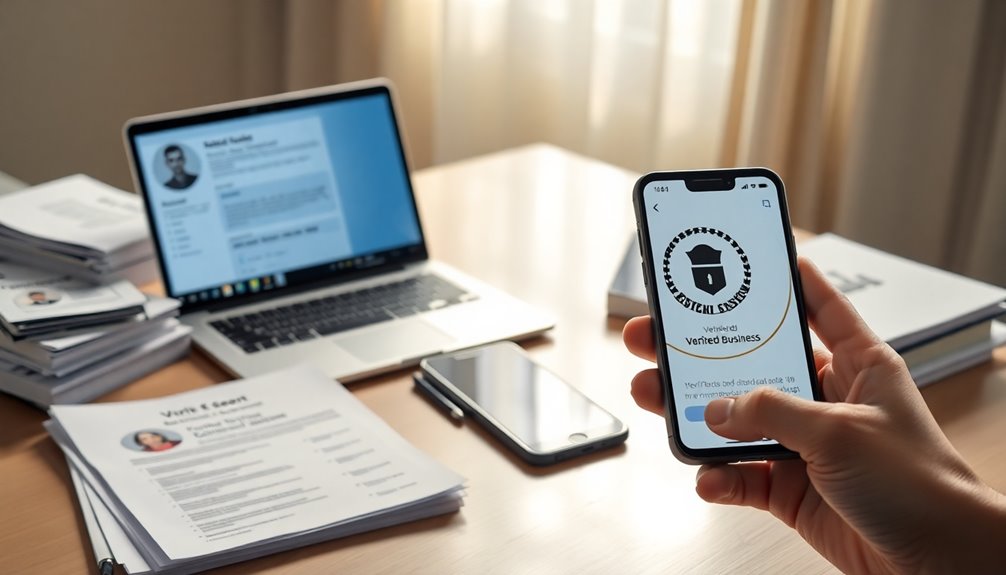To avoid freelance scams and make certain you get paid, verify your client’s legitimacy by checking their online presence, reviews, and official credentials. Always use clear contracts that specify scope, deadlines, and payment milestones. Rely on secure payment platforms like PayPal or Stripe, which offer dispute resolution and safeguard your earnings. Stay alert for warning signs and keep thorough records. Continuing further can help you master effective strategies to protect your work and income.
Key Takeaways
- Verify client legitimacy through online research, reviews, and official business credentials before starting work.
- Use clear, detailed contracts outlining scope, deadlines, payment milestones, and IP rights to protect your interests.
- Accept payments via trusted platforms like PayPal or Stripe that offer escrow and dispute resolution features.
- Keep thorough records of all communication, work progress, and transactions to support any payment disputes.
- Continuously educate yourself on scam tactics and industry best practices to recognize warning signs early.
Recognizing Common Freelance Scams and Tactics

Many freelance scams rely on manipulative tactics to lure victims, so maintaining vigilance is vital. One common trick involves fake clients who pretend to need urgent work, often requesting sensitive information or deposits upfront. Be wary of offers that seem too good to be true, as scammers often use these to steal your time or money. Phishing scams are also prevalent, where scammers send fake emails or messages that mimic legitimate platforms or clients to steal login details. Always verify the client’s identity through official channels before sharing personal information or beginning work. Recognizing these tactics helps you avoid falling for scams that can cost you time, money, and your reputation. Stay alert and trust your instincts when something feels off. Additionally, understanding the importance of credibility of a gold dealer can help you avoid fraudulent schemes in investments, which parallels the need for verification in freelance transactions. Regularly researching and confirming the legitimacy of potential clients can provide an extra layer of protection against scam tactics that target unsuspecting freelancers. Being aware of AI-powered verification tools can also assist in validating client authenticity efficiently. Incorporating background checks into your onboarding process can further reduce the risk of dealing with fraudulent clients. It’s also helpful to stay informed about common online scam methods so you can better recognize warning signs early.
Setting Clear Contracts and Payment Terms

To protect yourself from scams and misunderstandings, setting clear contracts and payment terms before starting any project is essential. A solid contract should include key clauses that specify scope, deadlines, and deliverables. Establishing payment milestones ensures you’re paid progressively and reduces risk. Here are four critical steps:
- Define specific contract clauses covering scope of work, revisions, and deadlines.
- Break down payments into milestones tied to completed tasks.
- Clearly state payment amounts and due dates for each milestone.
- Include consequences for missed payments or scope changes.
These details help prevent disputes and ensure you’re compensated fairly. Having a transparent contract with clear payment terms is your best defense against freelance scams. Additionally, understanding payment processing options can facilitate smoother transactions and reduce payment delays. Being familiar with contract clauses related to scope and deliverables further safeguards your work and payments. Moreover, recognizing signs of expired or spoiled products, like changes in appearance or odor, can help you avoid potential issues with your supplies or clients.
Furthermore, integrating risk assessment strategies in your contract can help identify potential issues early and mitigate them effectively.
Using Secure Payment Platforms

Using secure payment platforms is a critical step in protecting yourself from freelance scams. These platforms, like PayPal or Stripe, act as trusted payment gateways that guarantee your funds are safe until the work is completed. They offer built-in dispute resolution processes, allowing you to escalate issues if a client refuses to pay or if there’s a dispute over deliverables. By using these services, you minimize the risk of losing money, as they hold funds in escrow until both parties are satisfied. Additionally, many of these platforms provide transaction monitoring features that help detect suspicious activity early. Implementing security protocols such as two-factor authentication can further prevent unauthorized access to your accounts. Avoid accepting direct bank transfers or cash payments, which lack protection. Always verify that the payment platform is legitimate and familiar to both you and your client. Utilizing proper protection measures can further enhance your security, ensuring you get paid promptly and fairly.
Verifying Client Legitimacy and Background

Before working with a client, take the time to check their business credentials and verify their legitimacy. Research their online presence to see if they have a professional website or active social media profiles. These steps help you confirm they’re genuine and reduce the risk of scams. Additionally, assessing their website credibility can provide insights into their professionalism and reliability. Being aware of anime movies and their popularity can also help you recognize reputable sources and avoid counterfeit content online. Moreover, understanding crypto market trends can aid in assessing the stability and legitimacy of potential clients involved in digital ventures. Familiarity with product authenticity verification methods further supports your ability to identify trustworthy clients. Conducting due diligence through client background checks can significantly decrease the likelihood of falling victim to fraud.
Check Business Credentials
Checking a client’s business credentials is a crucial step in avoiding freelance scams. It helps confirm they’re legitimate and trustworthy. To do this effectively, consider these steps:
- Verify business registration details with government databases.
- Confirm licensing, permits, or certifications relevant to their industry.
- Look for official contact information and physical addresses.
- Search for reviews or complaints about the business online.
- Evaluate the overall bedroom environment and decor, as a genuine business often maintains a professional and consistent presentation.
- Additionally, assess the Floating on Water aspects of their operations, such as their online presence and website professionalism, since credible businesses typically maintain a polished digital footprint.
- Be attentive to self-watering plant pots or similar tools they mention, which can sometimes indicate the level of professionalism and attention to detail in their operations.
- Recognizing signs of astrological influence can also help determine if a client’s claims and branding are authentic or potentially misleading. Observing the outdoor living and design elements they emphasize may offer further insights into their business authenticity.
Research Online Presence
Researching a client’s online presence is essential for verifying their legitimacy and background. Start by checking their social media profiles, looking for consistent activity and professionalism. Genuine clients often maintain active, transparent accounts that reflect their business values. Next, review online reviews on platforms like Google or industry-specific sites. Positive feedback from previous freelancers indicates a trustworthy client, while negative reviews or unresolved complaints are red flags. Pay attention to how they respond to criticism and whether reviews seem authentic. Additionally, do a quick search for news or any mentions that could reveal legal issues or scams. Combining insights from social media and online reviews gives you a clearer picture of your potential client, helping you avoid scams and establish a safe working relationship. Understanding client reputation management can further safeguard your freelancing career, especially when assessing their online credibility and commitment to professionalism. Being aware of transparency and consistency in their online presence also signals a reputable client worth working with. Moreover, evaluating their online engagement can provide clues about their reliability and credibility, reinforcing your confidence in choosing the right clients. Maintaining awareness of their trustworthiness can help prevent potential misunderstandings or disputes down the line.
Protecting Your Work and Intellectual Property

Protecting your work and intellectual property is essential to avoid losing control or income from your freelance projects. Without proper safeguards, your ideas and creations can be stolen or misused. Here are four key steps to secure your rights:
- Use clear contracts that specify ownership of intellectual property.
- Implement confidentiality agreements to prevent unauthorized sharing.
- Keep detailed records of your work progress and communications.
- Watermark or add metadata to digital files to establish ownership.
- Stay informed about content protection strategies to adapt your safeguards against emerging threats.
Staying Informed About Latest Scams and Prevention Tips

Staying informed about the latest scams and prevention tips is essential because scammers continually evolve their tactics to target unsuspecting freelancers. To stay ahead, you should actively participate in freelance networking groups where members share recent scam alerts and experiences. Follow scam awareness campaigns run by industry organizations and trusted platforms, as they regularly publish updates on new schemes. Subscribe to newsletters and industry blogs that focus on fraud prevention, so you receive timely alerts. Attending webinars or online workshops can also boost your scam awareness. Being proactive in education helps you recognize warning signs early and avoid falling victim. The more informed you are, the better equipped you’ll be to protect your work, reputation, and income from emerging freelance scams.
Frequently Asked Questions
How Can I Build Long-Term Trust With New Clients?
To build long-term trust with new clients, prioritize open and honest client communication from the start. Be transparent about your processes, timelines, and pricing, which demonstrates reliability. Consistently deliver quality work on time, and keep clients updated on progress. Practicing transparency helps establish credibility, fosters positive relationships, and encourages clients to return. Over time, these transparency practices create a foundation of trust that benefits both you and your clients.
What Are the Signs of a Client Who Might Default on Payment?
You should watch for red flags like inconsistent or delayed payment patterns, which might indicate a client could default on payment. If they avoid clear contract terms, hesitate to pay upfront, or question your rates repeatedly, these are warning signs. Trust your instincts, and set boundaries early. Staying vigilant helps you spot potential issues before they become costly, ensuring you protect your work and income effectively.
How Do I Handle Disputes Over Work Quality or Payment?
Did you know 60% of freelance disputes are resolved through negotiation? When handling disputes over work quality or payment, stay calm and professional. Use dispute resolution methods like clear communication and documentation to support your case. Focus on payment negotiation, proposing fair solutions to reach an agreement. Keep records of all exchanges, and if needed, consider mediation or legal advice to finalize the resolution effectively.
Are There Specific Industries More Prone to Freelance Scams?
Certain niche markets and high-value projects tend to be more prone to freelance scams because they attract scammers seeking big payouts. You should be cautious when dealing with unfamiliar clients in these areas, especially if they rush payment or avoid detailed contracts. Always verify client credentials, use trusted platforms, and avoid upfront payments for unverified projects. Staying vigilant helps protect you from falling victim to scams in these high-stakes fields.
How Can I Diversify My Income Sources to Reduce Risk?
To diversify your income sources, focus on creating multiple income streams that include passive earnings like investments or online courses. You can also explore freelancing in different industries or offering various services to spread risk. This way, if one source slows down, others keep generating income. Building a diversified portfolio helps you stay financially stable, reduces reliance on a single client or industry, and provides more security in your earning potential.
Conclusion
By staying savvy, spotting scams, and securing swift, simple payments, you safeguard your skills and success. Stay vigilant, verify ventures, and value your work to avoid scams and guarantee steady pay. Remember, protection and preparedness prevent pitfalls. With caution and consistency, you craft a confident, thorough freelance career. Keep learning, look out, and lock in your livelihood—your dedication and discernment deliver you from danger and drive your dreams forward.









